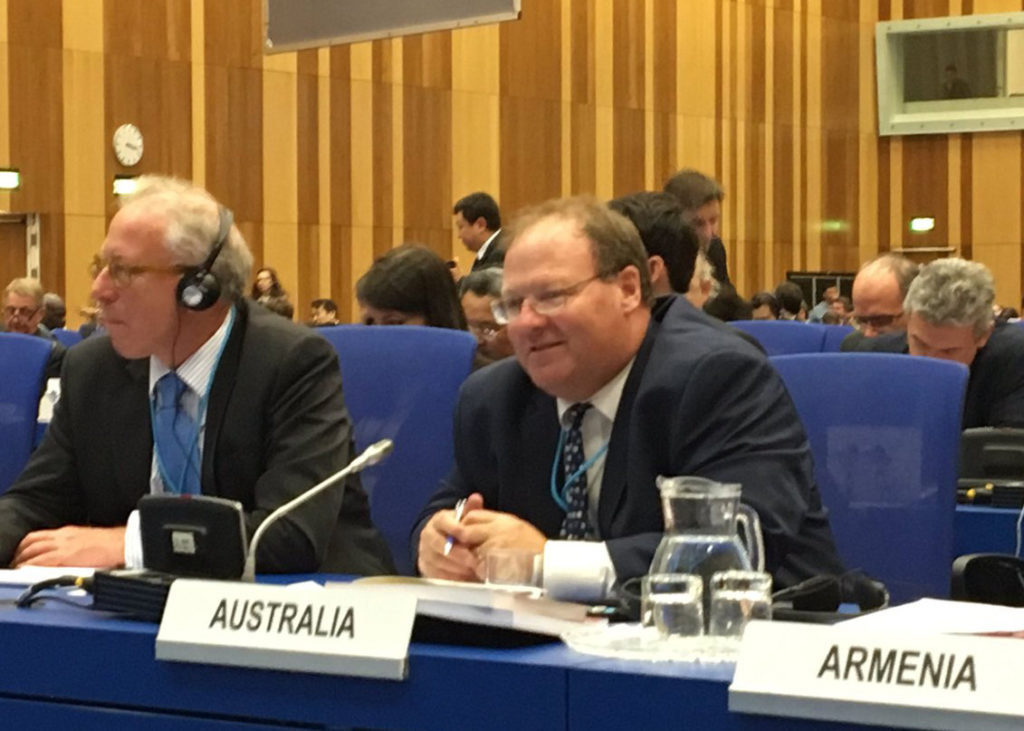FRESH AIR
Australia takes Iran concerns to nuclear watchdog
March 13, 2020 | Naomi Levin

The Australian Government has made one of its toughest and most comprehensive statements yet on Iran’s illegal nuclear development.
Speaking at the International Atomic Energy Agency (IAEA) Board of Governors’ meeting, Australia’s representative Richard Sadleir expressed Australia’s deep concern at Iran’s breaches of the international nuclear deal, known as the JCPOA.
“Iran’s failure to cooperate with the IAEA’s requests for clarification and access to two locations, in accordance with its obligations under its Comprehensive Safeguards Agreement and the Additional Protocol [JCPOA], is a matter of serious concern,” Sadleir, the Australian Ambassador to the IAEA, said.
“We urge Iran to address this issue immediately, to comply with its safeguards obligations without delay, and to cooperate fully with the IAEA.”
Australian officials have previously called on Iran to comply with the nuclear deal, but Sadleir’s address to the IAEA represents a shift in tone. He also raised the prospect of Australia withdrawing its support for the JCPOA if Iran’s behaviour does not change.
In the past year, Iran has announced successive breaches of various aspects of the JCPOA. A March report by IAEA director-general Rafael Mariano Grossi also revealed that Iran was restricting the nuclear watchdog from accessing areas where there is suspected nuclear activity and had avoided answering relevant questions.
But even though Sadleir’s statements were a welcome recognition by the Australian Government that Iran’s rogue nuclear activity continues to pose a security threat to the region and the world, a senior analyst has warned it may be too late to go back to the JCPOA.
Sadleir re-emphasised a statement made just days earlier in Canberra that Australia continues to support the JCPOA as a means to promote international security.
“For this objective to be realised, Iran must recommit itself to the terms of the deal, return to compliance, and engage in constructive diplomatic dialogue,” Sadleir told the IAEA.
“In light of this, Australia again strongly urges Iran to reverse its actions and to return immediately to full compliance with all of its obligations under the JCPOA.”
In response to Iran’s breaches of the 2015 nuclear deal, the European signatories to the JCPOA implemented dispute resolutions mechanisms earlier this year.
Sadleir said Australia, which is not a signatory to the deal, supported the introduction of these mechanisms.
“We call upon Iran to refrain from any further actions that might jeopardise these efforts, and encourage Iran to engage constructively in the dispute resolution mechanisms with a view to preserving the JCPOA and its important non-proliferation benefits,” Sadleir said.
The US, under President Donald Trump, withdrew from the JCPOA citing Iran’s non-compliance.
But Iran analyst and former White House official Michael Rubin said it is too late for the JCPOA to be used to effectively thwart Iran’s nuclear weapons ambitions.
“It’s not realistic to re-enter the JCPOA simply because of the sunset clauses in the agreement, allowing Iran to resume the program,” Rubin said.
The JCPOA includes a range of “sunset clauses”, meaning different aspects of the agreement expire at different times over coming years.
The first of these – this one relating to Iranian arms imports and exports – expires later this year. In 2023, according to the deal, Iran can lawfully continue working on advanced nuclear centrifuges.
“The Iranians would not agree to resume the status quo ante when many of the nuclear controls were otherwise due to expire during the next US presidential term,” Rubin said in response to questions about whether the US would re-enter the JCPOA if a Democrat won the upcoming presidential election.
RELATED ARTICLES

US Middle East strategy amid regional instability: Dana Stroul at the Sydney Institute

Antisemitism in Australia after the Bondi Massacre: Arsen Ostrovsky at the Sydney Institute





















